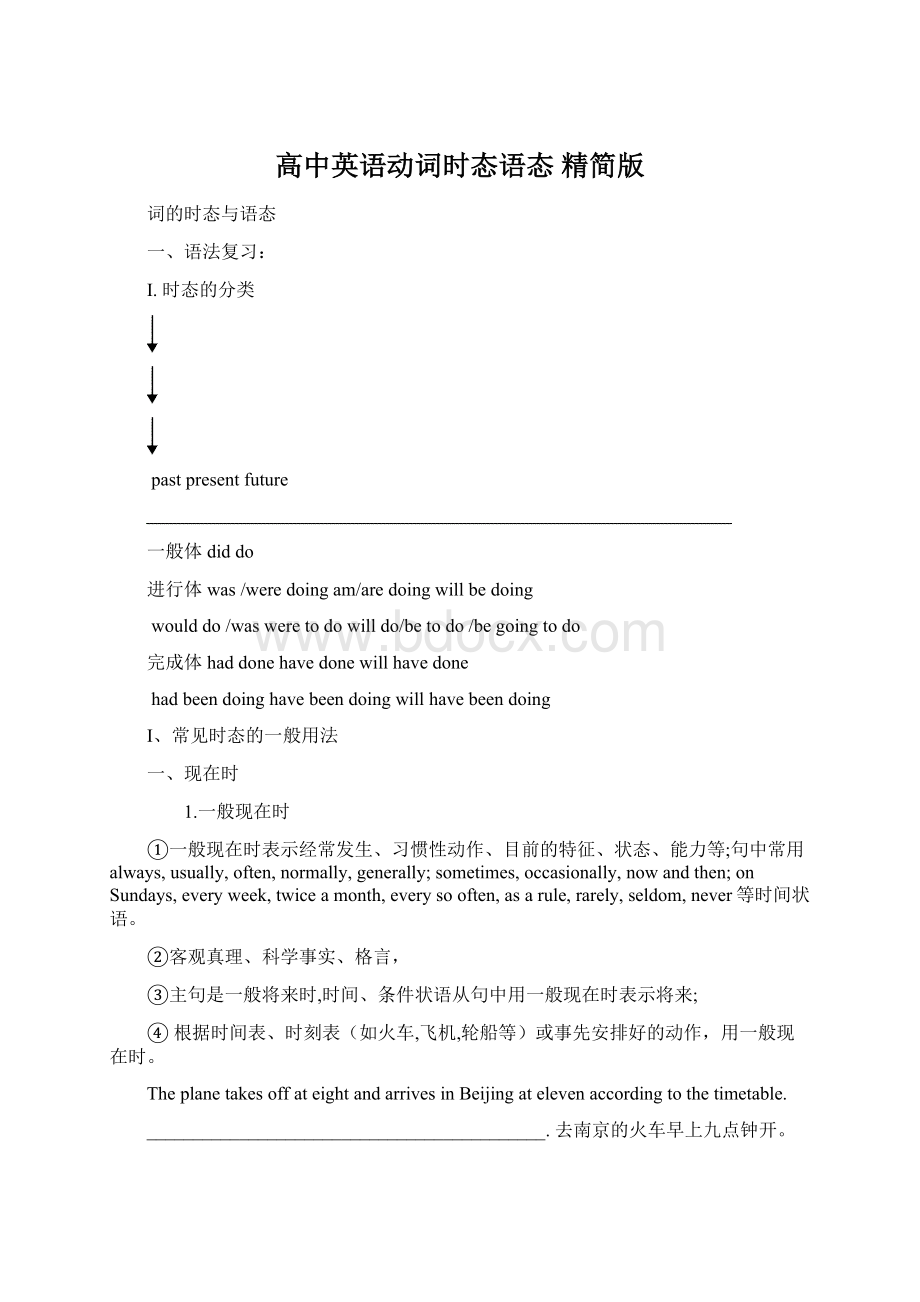高中英语动词时态语态 精简版.docx
《高中英语动词时态语态 精简版.docx》由会员分享,可在线阅读,更多相关《高中英语动词时态语态 精简版.docx(13页珍藏版)》请在冰豆网上搜索。

高中英语动词时态语态精简版
词的时态与语态
一、语法复习:
I.时态的分类
pastpresentfuture
一般体diddo
进行体was/weredoingam/aredoingwillbedoing
woulddo/wasweretodowilldo/betodo/begoingtodo
完成体haddonehavedonewillhavedone
hadbeendoinghavebeendoingwillhavebeendoing
Ⅰ、常见时态的一般用法
一、现在时
1.一般现在时
①一般现在时表示经常发生、习惯性动作、目前的特征、状态、能力等;句中常用always,usually,often,normally,generally;sometimes,occasionally,nowandthen;onSundays,everyweek,twiceamonth,everysooften,asarule,rarely,seldom,never等时间状语。
②客观真理、科学事实、格言,
③主句是一般将来时,时间、条件状语从句中用一般现在时表示将来;
④根据时间表、时刻表(如火车,飞机,轮船等)或事先安排好的动作,用一般现在时。
TheplanetakesoffateightandarrivesinBeijingatelevenaccordingtothetimetable.
___________________________________________.去南京的火车早上九点钟开。
注意:
近几年,对一般现在时的考查常用过去时态或现在完成时态对考生进行干扰
Monthsagowesailedtenthousandmilesacrosstheopensea,which_____thePacific,andwemetnostorm.
A.wascalledB.iscalledC.hadbeencalledD.hasbeencalled
2.现在进行
时
①表示正在进行的动作;
Heiswatchingafootballmatch.他正在看足球赛。
②与always,forever,constantly,continually连用,表示赞赏或厌恶等感情色彩。
Heisalwayshelpingothers.他总是肯帮助他人。
___________________________________________.她老是忘记某些事情。
③表示按计划安排即将发生的动作,常用动词:
come,go,leave,start。
SheisleavingforBeijing.她要去北京。
MyfatheriscomingtoseemethisSaturday.这个星期六我爸爸要来看我。
注:
大多数动词可用于进行时,但也有些动词不用于进行时。
常见的有:
▲感觉类:
look,smell,feel,sound,taste,
▲情感类:
like,love,prefer,admire,hate,fear
▲心态类:
wish,hope,expect,want,need,believe,think,understand,agree,know
▲所有类:
have,contain,won,hold,belongto等。
3.现在完成时
①表示过去发生的事情对现在产生的影响,或某个从过去某时间开始,延续到现在的动作。
着眼点在现在。
(现在完成时常与不确定的过去时间状语连用,如:
yet,just,before,recently,once,lately。
表示频度的时间状语连用,如:
often,ever,never,sometimes,twice,onseveraloccasions。
同包括现在时间在内的时间状语连用,如now,today,thismorning,thismonth,thisyear。
同表示一段的时间状语连用,如:
sofar,uptonow,since,lately,recently,inrecenttime,foralongtime,uptillnow,uptopresent,forthepast(last)fewyears,thesefewyears(weeks,days,months)等。
)
Shehaslostherwallet.她的手表丢了。
Ihaven’theardmuchofherlately.我最近不大听到她的消息。
HehaslearnedEnglishforsixyears./Theyhaveworkedheresincetheyleftcollege.
②表示“曾经到过某地(人已回来)”用“have/hasbeento”;
表示“到某地去了(还未回来)”用“have/hasgoneto”。
—WhereisLiHua?
-___________________________________________.他去阅览室了。
—SheknowsalotaboutShanghai.-____________________________.她曾经去过那。
③还可用在时间和条件状语从句中,表示将来某时完成的动作。
例如:
I’llgotoyourhomewhenIhavefinishedmyhomework.我做完了作业就去你家。
___________________________________________.如果早上不下雪了我就去公园.
注:
短暂动词(即瞬间动词),join,lose,buy,borrow,leave,go,come,arrive,die,marry,finish,complete,begin,start,breakout等,在完成时态中,其肯定式不能和表示一段时间的状语(FOR)连用。
4.现在完成进行时
①用来表示从过去某一时刻开始一直持续到现在(或今后还要继续一去)的动作;
Hehasbeendoingthemathsproblemssince8:
00/allday/allnight.
②凡是不能用于现在进行时的动词均不能用于现成完成进行时。
A.在现在时间里的几种时态的区别
1.____you_________(think)itpossibletocrosstheAtlanticOceanwithintenminutes?
2.________you______(think)ofbuyingasecond-handcar?
3.I_______________(nothave)anysleepforthepasttwentyhours.
4.He_____________(work)asanengineersincehegraduatedschool.
5.Where___________you________(put)thenewspaper?
Iwanttoreadit.
6.Aspecialceremony___(hold)tohonourthoseoutstandingscientistsinourcountryeveryyear.
7.Inthepasttwoyears,uptothirtythousandpeople___________(injure)inthetrafficaccidentsinthatcountry.
8.Theinventionofthecomputer_______(affect)theadvanceofsciencegreatly.
[例1]—Whatareyougoingtodothisafternoon?
--I’mgoingtothecinemawithsomefriends.Thefilm____quiteearly,sowe____tothebookstoreafterthat.
A.finished;aregoingB.finished;goC.finishes;aregoingD.finishes;go
[例2]Iwon’ttellthestudenttheanswertothemathproblemuntilhe____onitformorethananhour.
A.hasbeenworkingB.willhaveworkedC.willhavebeenworkingD.hadworked
[例3]Althoughthecausesofcancer_____,wedonotyethaveanypracticalwaytopreventit.
A.arebeinguncoveredB.havebeenuncoveringC.areuncoveringD.haveuncovered
[例4]Customersareaskedtomakesurethatthey____therightchangebeforeleavingtheshop.
A.willgiveB.havebeengivenC.havegivenD.willbegiven
二、过去时
5.一般过去时
①表达特定的过去时间内发生的动作或存在的状况,或过去某一时间内经常发生或反复发生的动作或为;Heoftensangwhenhewasaboy.
___________________________________________.她昨晚和男友去看电影了。
②用于Ididn’tknow…或Iforgot…,表示事先不知道或不记得,但现在已知道或记得的事情。
Ididn’tknowyouwerehere.(现在已经知道)
Sorry,Iforgottobringmybook.(“忘记带书”已成为过去的事了)
6.过去进行时
①表示过去某一时刻或某一段时间内正在进行的动作(这一过去时间须用时间状语表示);
Hewaspreparinghislecturealldayyesterday.
②与always,forever,constantly,continually连用,表示赞赏或厌恶等感情色彩。
ComradeLeiFengwasalwaysthinkingofothersandneverthinkingofhimself.
③过去计划、安排好的将来动作(只限于come,go,leave,arrive,start,move,sail,fly,travel,stay等);
Hesaidshewasarrivingthenextday.
7.过去完成时
①表示在过去某个动作或某个具体时间之前已经发生、完成的动作或情况。
TheyhadgoteverythingreadybeforeIcame.
___________________________________________.到上个星期为止她已经写了两本书了。
②以下句型只能用过去完成时。
(hardly/scarcelyhadsb.done…when…did…;nosooner…than…)
Hardly/scarcelyhadshefallenasleepwhenthedoorbellrang.
Nosoonerhadtheyleftthebuildingthanabombexploded.他们一离开这座楼炸弹就爆炸了。
③过去未曾实现的意图、打算或希望(只限于think,want,plan,mean,intend,hope,expect,suppose,wish,want等动词)。
Ihadwantedtopayavisittoyouyesterday,buttherainpreventedme.
我本来想昨天拜访你的,但是下雨(让我不能来)。
_________________________________________.我们本来想告诉她这个消息,但是发现她不在家。
B.在过去时间里的几种时态的区别
1.Yesterdayhe________(help)hismotherwiththehousework,andthereforehehadnotimetospareforhishomework..
2.LastSundaytheboy_______(visit)theirformerteacherandtoldhimtheprogresshe__________(make).
3.Theworkers_______________(repair)thebridgewhenaheavyraincamedown.
4.Thestudentpromisedthathe___________(cheat)anymore.
5.Bythetimetherainstopped,theblindman_______________(stand)intherainforhalfanhour.
6.Bythetimehermothergottothehospital,she______was_______(be)abletospeak.
7.Noonecanknowsexactlywho___________(invent)themusic.
8.Whenthefirebrigadearrived,people________(hurry)outofthebuildingonfire.
[例1]Susandecidednottoworkontheprogramathomebecauseshedidn’twantherparentstoknowwhatshe_____.
A.hasdoneB.haddoneC.wasdoingD.isdoing
[例2]MycousinwenttoCanadatwoyearsago.He____thereforafewmonthsandthenwenttoAmerica.
A.workedB.wouldworkC.wouldbeworkingD.hasbeenworking
[例3]Father_____forLondononbusinessuponmyarrival,soIdidn’tseehim.(福建2005NMET)
A.hasleftB.leftC.wasleavingD.hadleft
三、将来时
8.一般将来时
①现在看来以后要发生的动作或存在的状态或未事先考虑过,即说话时临时作出的决定。
Tomwillcomenextweek.
--Timisillandcan’tcometoday.
--Really?
I____goandseehimafterlunch.
__________________________________________你能告诉我到2100年世界会是什么样子么?
②事物的固有属性或必然趋势
Oilwillfloatinwater.
Fishwilldiewithoutwater.
Thewindowswon’topen.
Theenginewon’tstart.
TheTVsetsellswell.
一般将来时表达形式除了“will或shall+动词原形”外,还有以下几种:
①“tobegoingto+动词原形”,表示即将发生的或最近打算进行的事。
例如:
Wearegoingtohaveameetingtoday.今天我们开个会。
②go,come,start,move,sail,leave等可用进行时态表示按计划即将发生的动作。
例如
I’mleavingforBeijing.我要动身去北京。
③“beto+动词原形”表示按计划要发生的事或征求对方意见。
例如:
Ameetingistobeheldat3:
00o’clockthisafternoon.
Ifsb./sth.is/aretodo…,+主句,(主句表示必然条件)
Iftheplantaretosurvive,theymustbewatered.
④“beaboutto+动词原形”表示即将发生的动作。
例如:
Weareabouttoleave.我们就要动身了。
9.将来进行时
表示将来某个时刻正在进行的或持续的动作。
Whatwillyoubedoingthistimetomorrowafternoon?
10.将来完成时
表示持续到将来某时或某个动作之前已经完成的动作。
Ishallhavefinisheditbythetimehegetshome.
BynextMonday,shewillhavestudiedhereforthreeyears.
11.过去将来时
①过去某一时刻后将要发生的过去
动作或过去的意图打算(主要用于宾语从句中);
Shewassureshewouldsucceed.
Ithoughtyouwouldcome.
把一般将来时中的助动词变成过去式,便成了过去将来时的表达形式。
②表示过去经常发生的动作。
Whenhewasyoung,hewouldgoswimming.
C.在将来时间里的几种时态的区别
1.Onceyou________(make)upyourmind,don’tgiveupwhateverdifficultiesyoumeet.
2.He___________(read)fivenovelsinoriginalbytheendofthisyears.
3.I____________(teach)inthemiddleschoolfortwentyfiveyearswhenyougraduatenextyear.
4.Whenyougetthere,yourteachermight_______(give)alesson.Waituntilitisover.
5.Tomiseagertomakesurethathisfather______(promise)tobuyabikeforhim.
[例1]Atthistimetomorrow____overtheAtlantic.(北京2003NMET)
A.we’regoingtoflyB.we’llbeflyingC.we’llflyD.we’retofly
[例2]BythetimeJanegetshome,heraunt_____forLondontoattendameeting.(天津2005NMET)
A.willleaveB.leavesC.willhaveleftD.left
[例3]—Areyoustillbusy?
--Yes,I______mywork,anditwon’ttakelong.(浙江2005NMET)
A.justfinishB.amjustfinishingC.havejustfinishedD.amjustgoingtofinish
[例4]—_____leaveattheendofthismonth.
--Idon’tthinkyoushoulddothatuntil_____anotherjob.(北京2006NMET)
A.I’mgoingto;you’dfoundB.I’mgoingto;you’vefound
C.I’ll;you’llfindD.I’ll;you’dfind
[例5]Inaroomabovethestore,whereaparty____,someworkerswerebusilyseatingthetable.
A.wastobeheldB.hasbeenheldC.willbeheldD.isbeingheld
四.要求一定时态的固定的句型
1.when…(突然)
①sb.was/weredoingsth.whensth.happened(正在做某事,这时突然……)
Iwasreadingabookwhenthebellrang.
②sb.was/wereabouttodosth.when…didsth.(正要做某事,这时突然……)
Wewereabouttoleavewhenthetelephonerang.
③sb.hadn’tbeen/done…forsometimewhen…did...
Theyhadn’tbeeninthemountainfortwohourswhentheyfoundtheyneededaguide.
2.time
④It(This/That)isthefirst/second/t